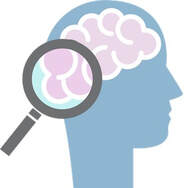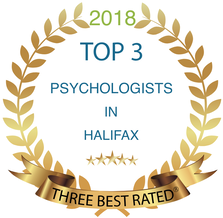Halifax Psychologist - Dr. Brent Conrad
Therapy, Counselling, and Assessment Dr. Brent Conrad, Halifax Psychologist
Located in Halifax, Nova Scotia, I am a registered Clinical Psychologist and along with the other Psychologists and Counsellors at my clinic, we provide comprehensive mental health treatment, diagnoses, and assessment for all of Nova Scotia.
What is the goal of therapy? Although every client is different and individual situations can be very complex, goals for therapy can be surprisingly simple. I help clients find relief from depression and anxiety, learn how to effectively manage stress, develop healthier relationships with others, overcome fears and insecurities, and actively create meaning and purpose in their lives. |
Contact Me Address: 1526 Dresden Row, Suite 602 Halifax, NS B3J 3K3 Email: [email protected] Directions: Click here for directions Additional Contact Info: Click here for more |

What therapy services do I offer?
● Focusing on the areas of Halifax, Dartmouth, Bedford, and Sackville I offer professional therapy and counselling services for issues such as depression, anxiety, stress, panic, relationship difficulties, low self-esteem, grief, anger management issues, internet and video game addiction, and many other personal difficulties.
● I am also partnered with the Bedford Psychologists clinic and own Green Leaf Psychological Services where our psychologists provide therapy for depression, anxiety, and most other mental health issues.
● Focusing on the areas of Halifax, Dartmouth, Bedford, and Sackville I offer professional therapy and counselling services for issues such as depression, anxiety, stress, panic, relationship difficulties, low self-esteem, grief, anger management issues, internet and video game addiction, and many other personal difficulties.
● I am also partnered with the Bedford Psychologists clinic and own Green Leaf Psychological Services where our psychologists provide therapy for depression, anxiety, and most other mental health issues.
|
What types of assessments are provided?
● I provide adult, adolescent, and child psychodiagnostic and psychoeducational assessments for learning disabilities, attention deficit hyperactivity disorder (ADHD), and giftedness. Great care is taken to make testing comfortable and enjoyable, to deliver clear and timely reports, and to provide practical and helpful suggestions you can actually use. ● If your child is struggling academically or is having problems in school, a quality psychoeducational assessment with a psychologist can provide the answer to "why?" and the solution to "what can we do about it?". ● I also offer adult psych-ed assessments for Learning Disabilities, IQ, and ADHD. |

Are in-person and virtual appointments available?
● Yes, I offer in-person therapy appointments at my Halifax office and secure online sessions are also available (however, I do find that in-person appointments are most effective).
● Yes, I offer in-person therapy appointments at my Halifax office and secure online sessions are also available (however, I do find that in-person appointments are most effective).

Does insurance cover the cost of a session with a psychologist?
● Nova Scotia health care (MSI) does not cover the fees of psychologists. However, if you have coverage for therapy or assessment under your extended health insurance policy, psychologists are always approved providers. Your coverage may include all or a portion of the fee. Just give your provider a quick call or check the details of your plan. In my experience, most policies through work, school, or private providers offer at least $1000 in coverage, usually more. I can direct bill most insurance companies.
● Nova Scotia health care (MSI) does not cover the fees of psychologists. However, if you have coverage for therapy or assessment under your extended health insurance policy, psychologists are always approved providers. Your coverage may include all or a portion of the fee. Just give your provider a quick call or check the details of your plan. In my experience, most policies through work, school, or private providers offer at least $1000 in coverage, usually more. I can direct bill most insurance companies.
Do I need a referral?
● You do not need a referral to see a private practice psychologist in Nova Scotia - just contact me to set up an appointment - it's really quite simple!
● You do not need a referral to see a private practice psychologist in Nova Scotia - just contact me to set up an appointment - it's really quite simple!

Do I need a psychologist or a psychiatrist? What is the difference?
● This is a very common question. While both diagnose and provide treatment for emotional and mental health conditions, there are some important differences.
● A clinical psychologist is a health professional who specializes in studying and treating mental and behavioral health issues using talk therapy. Psychologists do not prescribe medication. To use the title of “psychologist” in Nova Scotia, we must complete advanced graduate degrees (Masters or Doctorate) in psychology, clinical internships, extensive supervision, registration exams, and be approved by The Nova Scotia Board of Examiners in Psychology. It is a regulated profession and title – only those who complete these requirements can call themselves a psychologist. A session with a psychologist is normally one hour and meeting every two weeks or so is typical.
● A psychiatrist is a medical doctor who specializes in treating mental and behavioral health issues with more of a focus on pharmaceuticals / medication to treat serious mental health conditions such as psychosis, bipolar disorder, chronic severe depression, etc. Meetings with a psychiatrist are usually less frequent than with a psychologist (every few months) and also shorter. To see a psychiatrist in Nova Scotia, this generally requires a referral from your family doctor (or a walk-in clinic if you do not have a family doctor). As they are physicians, there is no payment required to see a psychiatrist in Nova Scotia.
● This is a very common question. While both diagnose and provide treatment for emotional and mental health conditions, there are some important differences.
● A clinical psychologist is a health professional who specializes in studying and treating mental and behavioral health issues using talk therapy. Psychologists do not prescribe medication. To use the title of “psychologist” in Nova Scotia, we must complete advanced graduate degrees (Masters or Doctorate) in psychology, clinical internships, extensive supervision, registration exams, and be approved by The Nova Scotia Board of Examiners in Psychology. It is a regulated profession and title – only those who complete these requirements can call themselves a psychologist. A session with a psychologist is normally one hour and meeting every two weeks or so is typical.
● A psychiatrist is a medical doctor who specializes in treating mental and behavioral health issues with more of a focus on pharmaceuticals / medication to treat serious mental health conditions such as psychosis, bipolar disorder, chronic severe depression, etc. Meetings with a psychiatrist are usually less frequent than with a psychologist (every few months) and also shorter. To see a psychiatrist in Nova Scotia, this generally requires a referral from your family doctor (or a walk-in clinic if you do not have a family doctor). As they are physicians, there is no payment required to see a psychiatrist in Nova Scotia.

Do you have questions? I'm happy to answer.
● If you are searching for psychologists or counsellors in Nova Scotia, please take some time to browse the site and feel free to contact me directly if you have any questions - I personally respond to every inquiry I receive - usually the very same day. Even if I do not provide the service you are seeking, I will do my best to point you in the right direction or provide other helpful resources.
● If you are searching for psychologists or counsellors in Nova Scotia, please take some time to browse the site and feel free to contact me directly if you have any questions - I personally respond to every inquiry I receive - usually the very same day. Even if I do not provide the service you are seeking, I will do my best to point you in the right direction or provide other helpful resources.
Trying to find the best psychologist for you? What should you look for in a therapist?
● Make sure to read Halifax Psychologists and How to Choose One or the Nova Scotia Psychologists FAQ before selecting anyone...the information should be very helpful.
● Make sure to read Halifax Psychologists and How to Choose One or the Nova Scotia Psychologists FAQ before selecting anyone...the information should be very helpful.
Questions? Send them my way :)

Please feel free to contact me if you have any questions at all about starting therapy, assessment, or selecting the best psychologist for you.
Seeing a therapist for personal issues is normal and healthy. It should not be scary, stressful, anxiety-provoking, or mysterious.
Ask a question - I personally respond to every message and am happy to assist in any way I can!
Why Choose Halifax Psychologist for Therapy or Assessment?
|
EFFECTIVE TREATMENT AND COUNSELLING
● Empirically validated treatment methods combined with a warm and friendly therapeutic style ● Extensive experience treating depression, anxiety, stress, relationship problems, anger, low self-esteem, internet and video game addiction, and many more psychological issues ● Solution-focused, goal-directed approach focused on tangible changes and results ● Twenty-five years of experience working with children, adolescents, and adults |
|
COMPREHENSIVE ADULT AND CHILD ASSESSMENT
● Comprehensive psychoeducational assessments with the goals of always exceeding expectations and providing clear, practical, and helpful feedback ● For child and teen psychoeducational and learning disability assessments, I am dedicated to having him or her actually enjoy the testing process and feel good about the meeting (yes, this is very common!) ● Free, no obligation consultation to discuss your child's school performance and whether an assessment is necessary (depending on the issue, full assessments are not always required or recommended and you will be informed if this is the case). Please note that you must specifically request the free 30 minute consultation if you are interested in this service. |
|
AFFORDABLE FEES
● Fees for counselling and assessment with a psychologist are covered by most insurance plans and direct billing is often possible ● All services are tax deductible and can be claimed as a medical expense ● No HST / GST charges |
|
ADDITIONAL BENEFITS AND CONVENIENCES
● Evening and weekend appointments are available to accommodate your busy schedule ● My clinic Green Leaf Psychological Services, is conveniently located just off Spring Garden Road in Halifax, Nova Scotia ● Parking is often available directly in front of my office, but if no spaces are open Park Lane Mall is always an option and is less than a 5-minute walk |
Therapy and Assessment Services for Nova Scotia
A selection of some of the concerns and mental health issues I and other psychologists offer evidence-based treatment for at my Halifax office.
Click through for more information including common treatment methods and please contact me if you have any questions. Thanks!
Click through for more information including common treatment methods and please contact me if you have any questions. Thanks!
THERAPY
Agoraphobia
Treatment of agoraphobia focuses on helping people confront and manage their fear responses, often through a combination of therapy and medication. It is generally based on the idea that exposure to feared situations is the most effective way to conquer the fear. Psychologists may use different approaches and tactics, such as:
- Teaching relaxation and coping techniques
- Using cognitive behavioral therapy to help individuals address negative thought patterns
- Practicing in-vivo exposure to gradually increase tolerance to the feared situation
anger management
Anger management treatments are designed to identify and manage anger in a healthy and productive way. This may include (but is not limited to):
- Identifying triggers of anger
- Identifying negative thought patterns associated with anger
- Developing better communication skills
- Practicing stress-management techniques
- Practicing relaxation techniques
- Practicing emotional intelligence
- Building healthy self-esteem
- Developing problem-solving skills
- Practicing assertiveness
- Practicing conflict resolution
anxiety
Psychotherapy for anxiety is based on the idea that identifying and addressing the underlying psychological issues can often be the best way to successfully manage anxiety.
Through counselling, clients are able to work through their feelings and worries in a structured and guided manner. This can help to gain deeper insight into the triggers for anxiety, and to develop healthier ways of coping and responding to anxious thoughts and feelings in the future.
Types of psychotherapy used to treat anxiety at my Halifax clinic include cognitive behavioral therapy, ACT, solution-focused therapy, and others.
Through counselling, clients are able to work through their feelings and worries in a structured and guided manner. This can help to gain deeper insight into the triggers for anxiety, and to develop healthier ways of coping and responding to anxious thoughts and feelings in the future.
Types of psychotherapy used to treat anxiety at my Halifax clinic include cognitive behavioral therapy, ACT, solution-focused therapy, and others.
assertiveness
Counselling with a psychologist for assertiveness focuses on helping clients learn to communicate effectively in a non-confrontational way. Assertiveness involves expressing yourself and your needs and opinions in a polite and respectful manner, regardless of who you are talking to.
Specific skill development can involve:
Specific skill development can involve:
- Identifying unhelpful thought patterns and beliefs around assertiveness
- Practicing verbal and non-verbal communication skills
- Practicing setting boundaries
- Practicing self-advocacy
- Practicing active listening skills
breakups and divorce
Counselling for breakups and divorce can be a difficult but important process for some individuals. It involves helping them cope with the emotions, thoughts, and feelings that often accompany a breakup or divorce. This may include dealing with feelings of sadness, anger, disappointment, or guilt, along with questions about self-worth or the future.
Therapy at my Halifax mental health clinic (Green Leaf Psychological) may involve:
Therapy at my Halifax mental health clinic (Green Leaf Psychological) may involve:
- Identifying and expressing emotions and feelings
- Identifying and understanding the reasons for the breakup or divorce
- Practicing effective relationship skills
- Practicing positive self-talk
- Practicing stress-management techniques
depression
Counselling for depression helps individuals explore and discuss their feelings, thoughts, and experiences related to their depression or mood-related concerns.
The therapeutic approach may involve a combination of talking, reflective exercises, and problem-solving strategies, as well as identifying and addressing internal and external factors that may be contributing to or triggering the symptoms of depression. Cognitive Behavioral Therapy (CBT), Acceptance and Commitment Therapy, and Solution Focused Therapy are empirically validated treatment methods for depression.
The therapeutic approach may involve a combination of talking, reflective exercises, and problem-solving strategies, as well as identifying and addressing internal and external factors that may be contributing to or triggering the symptoms of depression. Cognitive Behavioral Therapy (CBT), Acceptance and Commitment Therapy, and Solution Focused Therapy are empirically validated treatment methods for depression.
GRIEF
Grief counselling helps individuals cope with feelings of grief and loss. This may be after the death of a loved one, a life-changing event, or a painful separation or divorce.
In grief counselling, a counselor or therapist helps the individual to express and process their feelings, thoughts, and memories in a safe, non-judgmental space. It also involves helping clients to understand and accept their loss, and to identify ways to cope with their grief and continue moving forward with their life.
In grief counselling, a counselor or therapist helps the individual to express and process their feelings, thoughts, and memories in a safe, non-judgmental space. It also involves helping clients to understand and accept their loss, and to identify ways to cope with their grief and continue moving forward with their life.
job and work stress
Counselling with a psychologist for work and job stress can help you manage your thoughts and feelings related to your job, and help you develop a more positive and productive relationship with your work. At times, therapy may also focus on evaluating your match with your current job and the possibility of seeking other career options.
Counselling for work stress can help you to:
Counselling for work stress can help you to:
- Learn new ways to approach and perceive your work and workload
- Develop stress-management skills and techniques
- Identify and manage triggers for stress at work
- Explore the role of self-doubt and perfectionism
- Connect with inner resources and strengths that can help you better cope with work stress
LGBT Concerns
Counselling for LGBT-related concerns can be a helpful tool for people to process and manage experiences that are unique to the LGBT community, such as discrimination, self-doubt, coming out, and finding support and community.
Therapy can help you address specific concerns, including personal identity, social identity, family and relationship acceptance, self-esteem, mental health and well-being, spiritual or religious conflicts, grief and loss, medical and legal issues, and other aspects of your daily life. Counselling can also offer a safe space for you to explore your feelings, thoughts, and experiences.
Therapy can help you address specific concerns, including personal identity, social identity, family and relationship acceptance, self-esteem, mental health and well-being, spiritual or religious conflicts, grief and loss, medical and legal issues, and other aspects of your daily life. Counselling can also offer a safe space for you to explore your feelings, thoughts, and experiences.
Obsessive Compulsive Disorder
Therapy with a psychologist for Obsessive-Compulsive Disorder (OCD), is designed to help you manage obsessions, compulsions, and other related behavioral or cognitive symptoms.
OCD frequently involves intrusive thoughts and behaviours that can be distressing and disruptive to daily life. The focus of treatment is usually on helping you to identify and challenge unhelpful thinking patterns, reduce the intensity of obsessions and compulsions, increase tolerance for uncertainty and discomfort, and ultimately reduce the negative impact of the disorder on day-to-day functioning.
OCD frequently involves intrusive thoughts and behaviours that can be distressing and disruptive to daily life. The focus of treatment is usually on helping you to identify and challenge unhelpful thinking patterns, reduce the intensity of obsessions and compulsions, increase tolerance for uncertainty and discomfort, and ultimately reduce the negative impact of the disorder on day-to-day functioning.
panic attacks
Psychological therapy for panic attacks focuses on helping you identify and manage symptoms of panic, such as feelings of intense fear, feelings of impending doom, and physical symptoms such as chest pain, shortness of breath, and nausea.
One of the main goals of therapy for panic attacks is to help you identify and challenge the beliefs that may contribute to the onset and maintenance of panic. This may involve developing coping skills and techniques to deal with the symptoms, as well as understanding and addressing any factors which may have contributed to a recent increase in panic attacks.
One of the main goals of therapy for panic attacks is to help you identify and challenge the beliefs that may contribute to the onset and maintenance of panic. This may involve developing coping skills and techniques to deal with the symptoms, as well as understanding and addressing any factors which may have contributed to a recent increase in panic attacks.
perfectionism
Counselling for perfectionism helps you gain insight into their your thoughts and beliefs around needing to do everything perfectly, and explore how these beliefs and expectations may be negatively impacting your mental health, relationships, and overall quality of life.
Therapy for perfectionism may also involve identifying triggers for perfectionism, and developing healthier and more realistic expectations, and also helping you to become more flexible and accepting in dealing with mistakes and perceived failure.
Therapy for perfectionism may also involve identifying triggers for perfectionism, and developing healthier and more realistic expectations, and also helping you to become more flexible and accepting in dealing with mistakes and perceived failure.
phobias
A phobia is an extreme or irrational fear of a specific object, situation or activity. This can cause intense stress and impact your day-to-day functioning.
Therapy for phobias with a psychologist in Halifax can involve exposure therapy, in which the you are gradually exposed to the feared or avoided object or situation in a safe and supported environment. Depending on the nature of the phobia and your specific needs, counselling may also include cognitive behavioral therapy (CBT), relaxation techniques, stress management strategies, and identifying and working through any underlying beliefs and assumptions about the feared object, situation, or activity.
Therapy for phobias with a psychologist in Halifax can involve exposure therapy, in which the you are gradually exposed to the feared or avoided object or situation in a safe and supported environment. Depending on the nature of the phobia and your specific needs, counselling may also include cognitive behavioral therapy (CBT), relaxation techniques, stress management strategies, and identifying and working through any underlying beliefs and assumptions about the feared object, situation, or activity.
procrastination
Counselling for procrastination with a Halifax psycholgist can help you identify and address the thoughts, beliefs, and behaviors that contribute to delaying and avoiding important tasks or responsibilities.
Some of the elements that contribute to procrastination include fear of failure, perfectionism, self-doubt, and difficulty in organizing and prioritising tasks.
Counselling for procrastination may also involve helping you to develop strategies to manage time and workload effectively, building up skills in self-regulation, and addressing any underlying psychological or mental health issues which may be making it harder to be productive.
Some of the elements that contribute to procrastination include fear of failure, perfectionism, self-doubt, and difficulty in organizing and prioritising tasks.
Counselling for procrastination may also involve helping you to develop strategies to manage time and workload effectively, building up skills in self-regulation, and addressing any underlying psychological or mental health issues which may be making it harder to be productive.
relationship issues
Relationship counselling can help you address issues within your romantic, family, or friend relationships that have created feelings of tension, conflict, or disagreement.
The focus of this type of counselling is typically on helping the relationship, rather than on blaming individual behaviors. Counselling for relationships may involve identifying and addressing relationship patterns and communication issues, finding solutions to problems and conflicts, and helping you to become more conscious of your own feelings and behaviors in relationships.
Psychologists can also include learning and practicing healthy communication skills, and working to improve overall relationship satisfaction through active problem-solving.
The focus of this type of counselling is typically on helping the relationship, rather than on blaming individual behaviors. Counselling for relationships may involve identifying and addressing relationship patterns and communication issues, finding solutions to problems and conflicts, and helping you to become more conscious of your own feelings and behaviors in relationships.
Psychologists can also include learning and practicing healthy communication skills, and working to improve overall relationship satisfaction through active problem-solving.
self-esteem / self-confidence
Therapy for self-esteem can help you to develop and maintain a positive sense of self-worth, self-esteem and self-confidence. This type of therapy is focused on addressing and improving thoughts, beliefs, and behaviors related to low self-esteem. A key goal is often to challenge self-destructive thought patterns and to build a more positive and realistic view of oneself.
Psychologists may explore the social and psychological impacts of low self-esteem, and focus on learning social and emotional skills to help overcome feelings of shame and inferiority.
Psychologists may explore the social and psychological impacts of low self-esteem, and focus on learning social and emotional skills to help overcome feelings of shame and inferiority.
social anxiety and shyness
Therapy and counselling with a psychologist for social anxiety and shyness works by helping you overcome feelings of fear, anxiety, and self-consciousness in social situations. Key goals include helping you build confidence, reduce anxiety, and develop the social skills needed to effectively interact and communicate with others.
Therapy for social anxiety and shyness may include cognitive behavioral therapy (CBT), relaxation techniques, role-playing and practice, mindfulness-based practices, and helping you to identify and challenge negative thoughts and beliefs associated with social and performance anxiety.
Therapy for social anxiety and shyness may include cognitive behavioral therapy (CBT), relaxation techniques, role-playing and practice, mindfulness-based practices, and helping you to identify and challenge negative thoughts and beliefs associated with social and performance anxiety.
stress management
Stress management therapy is designed to help provide you with the skills and resources needed to effectively manage stress in a healthy and productive way.
Stress management therapy can involve teaching you how to:
Stress management therapy can involve teaching you how to:
- Identify and address stress and stress-related issues
- Learn to identify the physical, emotional, and psychological feelings associated with stress
- Manage your time effectively and learn how to work more productively
- Learn to develop and maintain healthy work-life balance
- Develop healthy ways to manage your day-to-day stress levels in order to reduce or prevent future stress
ASSESSMENT
learning disabilities / psych-ed
An assessment with a psychologist for learning disabilities (for children or adults) includes a clinical interview, comprehensive evaluation of cognitive and educational abilities and skills, such as problem-solving, memory, attention, concentration, reading, writing, math, verbal expression, etc. The assessment includes standardized tests for intelligence and academic skills, a review of school and academic records, and interviews with teachers, parents or anyone else who can speak to the individual's learning abilities.
Please see Halifax Psychologist Assessment FAQs for more infomration.
Please see Halifax Psychologist Assessment FAQs for more infomration.
ADHD
Attention deficit hyperactivity disorder (ADHD) is a neurodevelopmental disorder that affects children, adolescents, and adults. It is characterized by difficulties in attention, impulse control, and hyperactivity. The symptoms usually begin in childhood but can persist into adulthood. ADHD can impact functioning in various areas of life and can lead to emotional, social, and academic issues. The treatment of ADHD may involve medication and therapy, but it is also important to address environmental and lifestyle factors that may exacerbate or aggravate ADHD symptoms.
IQ / Intelligence
IQ testing with a psychologist measures various aspects of an individual's cognitive abilities and functioning. The most commonly used tests are the Wechsler Intelligence Scales for Children (WISC) and the Wechsler Adult Intelligence Scale (WAIS). These test a variety of cognitive abilities including language, reasoning, memory, and processing speed. IQ testing is important to identify any underlying cognitive or learning difficulties. The results of these exams can be used to understand a person's strengths and areas that may need further support and development.
Professional Psychological Associations
|
Copyright © 2024
Dr. Brent Conrad, Halifax Psychologist. All rights reserved. 1526 Dresen Row, Suite 602, Halifax, Nova Scotia, B3J 3K3 www.HalifaxPsychologist.com |




















